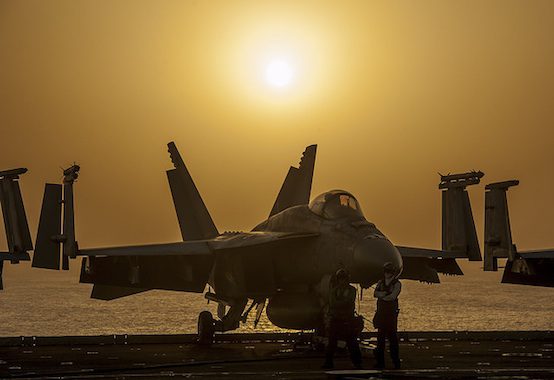Escalating the War on ISIS Is a Mistake

Roger Cohen doesn’t want us to be “seduced” by reasonable arguments that point out the shortcomings of military intervention:
To defeat ISIS in Syria and Iraq will require NATO forces on the ground. After the protracted and inconclusive Western interventions in Iraq and Afghanistan, it is reasonable to ask if this would not be folly. It is also reasonable to demand – and many will – whether military action will only have the effect of winning more recruits for ISIS as more lives and treasure are squandered. Terrorism, the old nostrum has it, can never be completely defeated.
Such arguments are seductive but must be resisted. An air war against ISIS will not get the job done; the Paris attacks occurred well into an unpersuasive bombing campaign.
In other words, there is a reasonable case that escalation of the war on ISIS is the wrong response to these attacks and that the costs of “destroying” ISIS will likely far exceed the benefits, but we should ignore all of this so that we can get on with the expanded war. As ever, the burden of proof is on the advocates of more aggressive measures, and as always they are failing to show that the more aggressive measures they want will produce the desired results. The danger in the wake of these heinous attacks is not that the U.S. and its allies will be too careful or limited in their response, but that they will overreach and commit themselves to a conflict whose costs they aren’t actually prepared to pay. The argument that needs to be resisted and challenged at the moment is that the best and most appropriate response is a military one, and that is the argument Cohen is making.
It is worth noting here that “NATO forces on the ground” will mean mostly American forces. Besides France and the U.S., there may be a handful of NATO governments both willing and able to contribute to a ground war in Syria, but the burden and costs of any NATO campaign will be borne primarily and overwhelmingly by the U.S. Cohen knows as well as anyone that there is little or no political support for that kind of war here in the U.S., and even the most hawkish presidential candidates are reluctant to say that the president should send large numbers of U.S. forces to fight in Syria. Lots of politicians and pundits want to declare their desire to “eradicate” ISIS, but no one wants to spell out what doing so would cost, how long it would take, and how much longer U.S. and allied forces would have to remain in Syria once the initial campaign was finished. That is because the public would justifiably recoil from an honest assessment of what would be required.
The U.S. just learned the hard way over the last fourteen years that we should be avoiding prolonged, open-ended wars in countries that we don’t understand very well. Plunging even deeper into the war in Syria may seem momentarily satisfying for many people in the West, but we should know by now that the costs will be much higher than we expect, the intervention will not be the remedy that is being promised, and it will create additional, unforeseen problems that will plague us later on. Escalating the war on ISIS is a mistake, but unfortunately it appears to be one that the U.S. and its allies are making without the slightest hesitation.
Comments